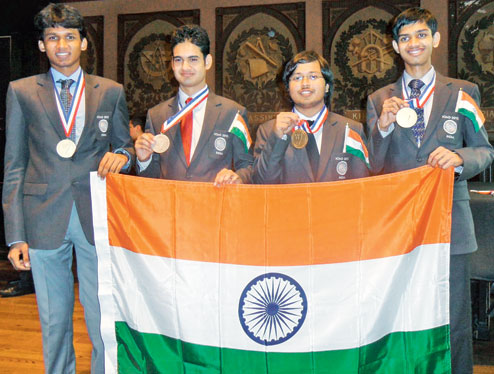 |
| Diptarka Hait (third from left) with Olympiad teammates Manav Avlani, Nimit Singh and Shubham Chandak |
An Olympiad gold has come to Bengal, not from London, but from Washington, DC. That is where the 44th International Chemistry Olympiad took place last week, drawing in the brightest science students from schools of 72 countries.
Diptarka Hait, an 18-year-old from Salt Lake, is a part of the four-member team that returned to the country early on Wednesday after putting up the best-ever performance by India in the competition (three golds and a silver). And Diptarka is the star of the contingent.
“This is Diptarka’s third year of participation and he has come back with a medal every time. He had won silver in 2010, his first year of participation, and got gold in 2011 too. This is the first hat-trick of medal wins by an Indian student in the Chemistry Olympiad,” Vijay Singh, national co-ordinator, Science Olympiads, told Metro from Mumbai. He could remember only one other instance of an Indian hat-trick in a science Olympiad. Olympiads are held in four other subjects as well.
A hat-trick, explained Savita Ladage, the co-ordinator of the Chemistry Olympiad programme in India, is rare because students at the secondary level, though free to participate, do not usually make it to the team. “Diptarka was an exception by qualifying while he was still in Class X. Thus he got three shots at the medals.”
The boy, who had raised eyebrows in 2011 by coming fourth in the state Joint Entrance Examinations while in Class XI, has stood out this year by jointly top-scoring in the experimental part of the competition among 283 contestants.
This meant he received the highly prestigious prize awarded by the International Union for Pure and Applied Chemistry, the apex body on the subject, for best performance in experimental test which he shared with a student from Japan.
The team was felicitated on arrival at the Homi Bhabha Centre for Science Education in Mumbai, the nodal centre for Olympiad programmes in India.
Ladage, who had accompanied the team to Washington, is ecstatic about Diptarka getting the prize. “Indian students are disadvantaged as the experimental aspect of chemistry is almost non-existent in our school syllabi unlike in countries of the former Soviet bloc, China or Germany. The problems given to them at the Olympiad are of the highest level of difficulty for the pre-university stage. This is only the second time that an Indian student has got the prize.”
Set to join the Massachusetts Institute of Technology this August, Diptarka said he owed all his knowledge of experimental chemistry and half of theoretical chemistry to the pre-departure training he received at the centre over the years. “I hope participation in the Olympiads goes up in Bengal. It is a great way to increase knowledge as well as make friends with similar interests.”











